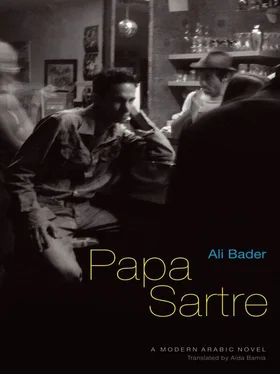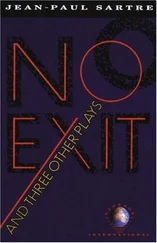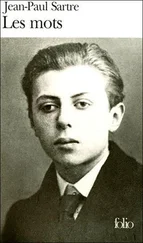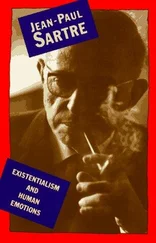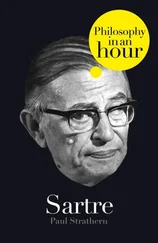Abd al-Rahman pushed aside the muslin curtains and peered through the large balcony that overlooked the souk and saw women selling radishes, vegetables, and fresh figs from large baskets wrapped in checkered black scarves that they carried on their heads. Their children, with shaven heads, were breastfeeding. Customers, men and women, were moving among piles of lemons and oranges in huge wooden bowls, baskets of onions, green peppers, apples, and boxes of pressed dates. At the far end of the souk there were cages of ducks, hens, and small birds piled atop one another. Sheep were jumping at the railing of a bushy garden, a mysterious looking thicket where pots of basil and flowers were covered in shade.
Abd al-Rahman got dressed in front of the long armoire mirror in his warm bedroom. He tied his slim blue tie and slipped on his square eyeglasses with black plastic frames. He compared his reflection to Sartre’s photograph hanging on the wall and was overwhelmed with sadness. What if I were one-eyed? The two of us would have looked alike! Abd al-Rahman had shaved his mustache and styled his hair like Sartre’s. His handsome oval face reflected all of Sartre’s features: a slim nose, slightly rounded cheeks, and a small mouth, all resulting in a similarity that fell short of being complete as long as he had both eyes. What would happen if he became one-eyed and turned into another Sartre? Abd al-Rahman felt at this moment the cruelty of existence; he thought that life was not fair. Had life been fair he, Abd al-Rahman, would have been born one-eyed, God would have made him so, like Jaseb, the vegetable seller of al-Sadriya souk. This illiterate, one-eyed man was not aware of his eye’s Sartrian genius, the philosophical greatness of his imperfect eye, and the place of this imperfect eye in the history of philosophy. Jaseb preferred his good eye to his imperfect eye, unaware of the commonness and vulgarity of his good eye. He was usually sad, ashamed of his physical defect, living in a world where most people had two eyes, a world where everybody sought perfection.
Abd al-Rahman was well aware of the value and greatness of being one-eyed, but he knew that a metaphysical condition like that achieved by the god of knowledge, Sartre, was unattainable. He lost all hope of ever reaching that condition and felt his existence incomplete and dull. The sight of Jaseb tortured him, and he quarreled with him whenever he saw him. He swore at him, threatened him, and at the top of his lungs shouted at him, “By God, if it were not for that one eye of yours arguing in your favor, I would have smashed your head with my shoe.”
Jaseb did not understand the philosopher’s position toward his one eye and considered his words a bitter mockery of his physical defect. Abd al-Rahman would swear angrily at him, saying, “Damn your father and your father’s father and Suhail Idris’s father too!” Jaseb had no idea who Suhail Idris was, but realized that the man was responsible for the state of madness and loss that overcame people at that time. Jaseb listened carefully to the comments made by Shaul, the Jew who plotted against Arab existentialism. He was the source of the insults that Jaseb threw at his enemy, Abd al-Rahman, when he stood with his cart close to Shaul’s shop in al-Sadriya souk.
Abd al-Rahman was haunted by his own binocular condition even while he was in Paris, the capital of existentialism, at the Sorbonne working toward his doctorate in existential philosophy in the late fifties. But he failed in his studies and returned home without a degree in French existentialism. Instead, like all Iraqis who seek knowledge overseas but return without a degree, he brought back a blonde French wife. Trying to console an Iraqi whose son returned home unsuccessful in his studies but lucky in love, Nouri al-Said commented to him, “Short of acquiring knowledge, at least marry someone from among the knowledgeable people.”
No one at that time knew that Abd al-Rahman had very good and sound reasons for marrying a Frenchwoman. He would not have married Germaine had she been an ordinary woman with ordinary qualities. He did not marry her simply because she was blonde. He married her — and this very few people knew— because she was Sartre’s compatriot.
Late one night Abd al-Rahman got lost in one of the dark alleys of Paris on his way home from a bout of drinking in a bar. He stood on a corner of the alley by a telephone pole in the pitch-black night as a cold wind whistled through the streets and a heavy fog settled softly over the city. He put his hands in his pockets, rolled up his coat collar, wrapped his scarf around his neck, and was trembling from cold, feeling the humidity seep through his shoes. He suddenly saw a young woman leaving a high-rise building. He stopped her to ask for directions home. She walked with him to his apartment.
Germaine was a modest young lady working as a babysitter for a weekly wage. She wasn’t beautiful, but she was fair skinned, blonde, and green-eyed. Abd al-Rahman was relieved when they reached the street that led to his apartment, and he asked her about her origins; it’s a common practice among Iraqis upon meeting a foreigner to inquire about his tribe.
She was from Paris, she said, then turned to leave. Her words were like a revelation to him, a gift falling from the sky. He caught up with her and wouldn’t let her go. “You must be an associate of Sartre’s, aren’t you?” he asked her, “Are you related to him?” The thin blonde girl was surprised. She had never heard the name Sartre. She shook her shoulders in astonishment as she looked at the face of the man sinking into his black coat between the white collar and the scarf.
“Oh! You do not know Sartre! Sheikh Hani Halil wrote a response to his work in three volumes, entitled, The obliterating and crushing response to the straying Jean son of Paul son of Sartre.”
She inquired, extremely amused, “Who is this Sheikh?”
Surprised, Abd al-Rahman wondered aloud, “Oh! You do not know Sheikh Hani Halil either! He’s a famous scholar. He was a student at Najaf, who nearly caused a diplomatic incident between France and Iraq with his book.”
The truth of the matter was that Abd al-Rahman was enamored of the great French philosopher and his philosophy but never managed to meet him during his stay in Paris. He had seen Sartre a few times on the Boulevard Saint-Michel, in the Latin Quarter, at the Sorbonne, at the Café Nîme in Montparnasse, in Saint-Germain-des-Prés, and browsing through books displayed on the quay of the Seine. Abd al-Rahman was intimidated by Sartre, feared him, and every time he got close to the philosopher, he trembled with fear and left without speaking to him.
There were reasons for this fear. One was that Abd al-Rahman’s French was not strong enough to allow him to engage in any kind of debate with the philosopher. During his stay in Paris he failed to master the language, despite serious efforts to learn it. He could only discuss general topics and had difficulty reading literary and philosophical texts. His professor at the university strongly advised him to master French, explaining that he would not be able to study French philosophy with a weak and shaky comprehension of the language.
He saw in the skinny girl a conversation partner, one with whom he could discuss philosophy as much as he liked, the same way he boasted to the prostitutes who visited his apartment. They were not at all concerned with the veracity or quality of his arguments. He was mistaken in thinking that Germaine believed him when, at the end of their steamy sexual encounters during which he demonstrated his virility, he would tell her that he was nauseated.
Everything around him made him feel the meaninglessness of existence and thus nauseated him. Feverish lovemaking with the girl made him sick. The piece of red steak he gluttonously ate and washed down with red wine made him sick. As did the high-quality cigarettes he avidly smoked. His wanderings in the Bois de Boulogne, the easy pleasures of the Latin Quarter, the x-rated movies in Saint-Michel, shiny shoes, silk neckties, and strong perfumes — everything made him sick.
Читать дальше
